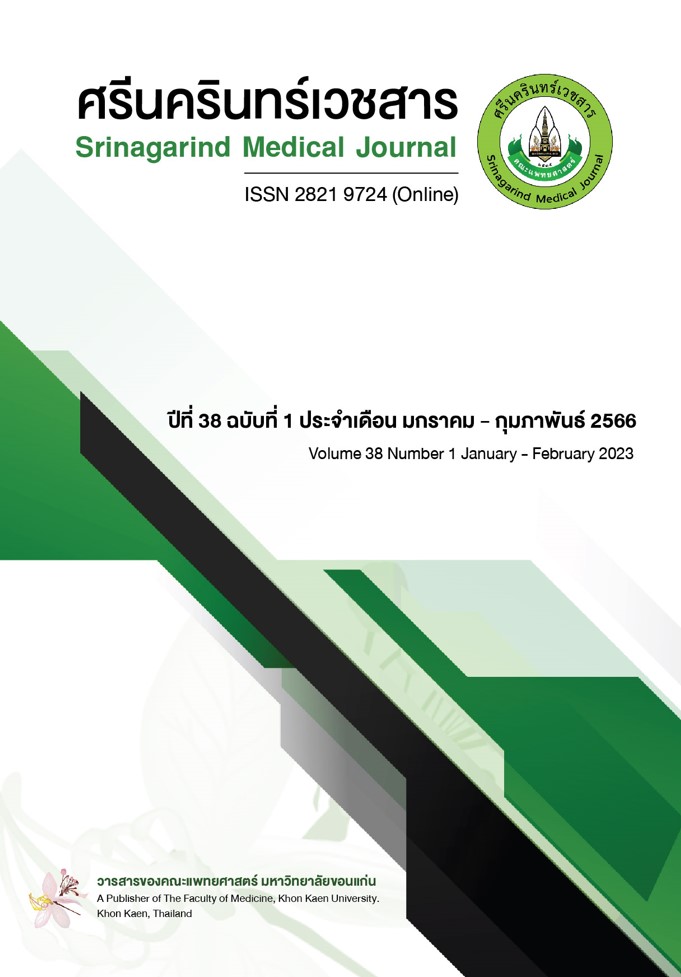ปัจจัยที่สัมพันธ์กับความร่วมมือในการใช้ยากันชักของผู้ป่วยภายหลังได้รับการผ่าตัดทางระบบประสาทและสมอง
Abstract
Factors Related to Antiepileptic Drug Adherence in Post-Neurosurgeries Patients
Wipada Mongkolpech1, Chanokporn Jitpanya2
1 Faculty of Nursing, Chulalongkorn University
2 Srisavarindhira, Thai Red Cross Institute Of Nursing.
หลักการและวัตถุประสงค์: อาการชักเป็นอาการที่พบได้บ่อยในผู้ป่วยภายหลังได้รับการผ่าตัดทางระบบประสาทและสมอง ผู้ป่วยกลุ่มนี้จึงมีระยะเวลาในการรับประทานยากันชักค่อนข้างนาน ความร่วมมือในการใช้ยาเป็นการรับประทานยาตามคำแนะนำของบุคลากรทางการแพทย์ ส่งผลให้ผู้ป่วยเกิดความร่วมมือในการรับประทานยาที่ดี ดังนั้นการศึกษาปัจจัยที่มีความสัมพันธ์กับความร่วมมือในการรับประทานยากันชักจึงเป็นสิ่งสำคัญ และเป็นวัตถุประสงค์เพื่อศึกษาปัจจัยที่สัมพันธ์กับความร่วมมือในการรับประทานยากันชักของผู้ป่วยภายหลังการผ่าตัดระบบประสาทและสมอง
วิธีการศึกษา: ศึกษาในกลุ่มผู้ป่วยชายและหญิง อายุ 18-59 ปี ที่ได้รับการผ่าตัดระบบประสาทและสมองและได้รับยากันชัก แผนกผู้ป่วยนอกศัลยกรรมระบบประสาทและสมอง จำนวน 110 ราย เครื่องมือที่ใช้ในการวิจัย ได้แก่แบบสอบถามข้อมูลส่วนบุคคล แบบประเมินการรับรู้เกี่ยวกับการเจ็บป่วย แบบประเมินการจัดการตนเอง แบบประเมินภาวะซึมเศร้า แบบประเมินอาการไม่พึงประสงค์จากการใช้ยา แบบประเมินการสนับสนุนทางสังคม และแบบประเมินความร่วมมือในการรับประทานยากันชัก
ผลการศึกษา: กลุ่มตัวอย่างส่วนใหญ่ (ร้อยละ 77.3) มีความร่วมมือในการรับประทานยากันชักในระดับดี การรับรู้เกี่ยวกับการเจ็บป่วย (r = -.340) อาการไม่พึงประสงค์จากการใช้ยา (r = -.242) มีความสัมพันธ์ทางลบกับความร่วมมือในการรับประทานยากันชักอย่างมีนัยสำคัญทางสถิติ p < .05 ส่วนการจัดการตนเอง ภาวะซึมเศร้า และการสนับสนุนทางสังคมไม่มีความสัมพันธ์กับความร่วมมือในการรับประทานยากันชักอย่างมีนัยสำคัญทางสถิติ p < .05
สรุป: พยาบาลควรแนะนำและให้ความรู้เกี่ยวกับโรค การรักษา ยาที่ผู้ป่วยได้รับ อาการข้างเคียงของยา การปฏิบัติตัวที่ถูกต้องเกี่ยวกับการรับประทานยา การเก็บรักษายา และอาการผิดปกติที่ควรมาพบแพทย์ นอกจากนี้พยาบาลควรส่งเสริมให้ผู้ป่วยมีการรับรู้ความเจ็บป่วยของตนเองได้ถูกต้องเพื่อให้ผู้ป่วยมีการจัดการตนเองที่เหมาะสมภายหลังการผ่าตัด
Background and Objective: Convulsion was frequently reported in patients after neurosurgeries. Taking antiepileptic drug among the patients lasted for a while. Medication adherence was the extent to which a patient's behavior taking medication corresponds with the agreed recommendations from a healthcare provider. Therefore, it was significant to study factors affecting adherence of antiepileptic drugs. This study aimed to investigate factors relating to adherence of epileptic drugs among patients post neurosurgeries.
Materials and Methods: The samples consisted of 110 post neurosurgeries patients; aged between 18-59 years. both male and female attending at Surgical Outpatient Department. The research instruments consisted of the demographic questionnaire, the illness perception questionnaire, the self-management questionnaire, the depression questionnaire, the adverse drug reaction questionnaire, the social support questionnaire, and the medication adherence questionnaire.
Results: Most patients (77.3%) had a high level of antiepileptic drug adherence. Illness perception (r = -.340) and adverse drug reaction (r = -.242) were significantly associated with antiepileptic drug adherence (p<.05). However, no statistically significant association between self-management, depression, social support and adherence to antiepileptic drug were found.
Conclusion: Nurses should provide knowledge about disease, treatment, drug side effect, medication adherence behaviors, drug storage, and abnormal symptoms leading them to see doctors. Moreover, nurses should promote patients’ illness perception aiming to their appropriate self-management behaviors after neurosurgeries.
Downloads
Published
Issue
Section
License

This work is licensed under a Creative Commons Attribution-NonCommercial-NoDerivatives 4.0 International License.


